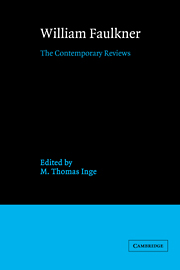Book contents
- Frontmatter
- Contents
- Series Editor's Preface
- Introduction
- Acknowledgments
- The Marble Faun (1924)
- Soldiers' Pay (1926)
- Mosquitoes (1927)
- Sartoris (1929)
- The Sound and the Fury (1929)
- As I Lay Dying (1930)
- Sanctuary (1931)
- These Thirteen (1931)
- Salmagundi and Miss Zilphia Gant (1932)
- Light in August (1932)
- A Green Bough (1933)
- Doctor Martino and Other Stories (1934)
- Pylon (1935)
- Absalom, Absalom! (1936)
- The Unvanquished (1938)
- The Wild Palms (1939)
- The Hamlet (1940)
- Go Down, Moses and Other Stories (1942)
- The Portable Faulkner (1946)
- Intruder in the Dust (1948)
- Knight's Gambit (1949)
- Collected Stories (1950)
- Notes on a Horsethief (1950)
- Requiem for a Nun (1951)
- Mirrors of Chartres Street (1954)
- The Faulkner Reader (1954)
- A Fable (1954)
- Big Woods (1955)
- The Town (1957)
- New Orleans Sketches (1958)
- Three Famous Short Novels (1958)
- The Mansion (1959)
- The Reivers (1962)
- Index
Light in August (1932)
Published online by Cambridge University Press: 07 September 2009
- Frontmatter
- Contents
- Series Editor's Preface
- Introduction
- Acknowledgments
- The Marble Faun (1924)
- Soldiers' Pay (1926)
- Mosquitoes (1927)
- Sartoris (1929)
- The Sound and the Fury (1929)
- As I Lay Dying (1930)
- Sanctuary (1931)
- These Thirteen (1931)
- Salmagundi and Miss Zilphia Gant (1932)
- Light in August (1932)
- A Green Bough (1933)
- Doctor Martino and Other Stories (1934)
- Pylon (1935)
- Absalom, Absalom! (1936)
- The Unvanquished (1938)
- The Wild Palms (1939)
- The Hamlet (1940)
- Go Down, Moses and Other Stories (1942)
- The Portable Faulkner (1946)
- Intruder in the Dust (1948)
- Knight's Gambit (1949)
- Collected Stories (1950)
- Notes on a Horsethief (1950)
- Requiem for a Nun (1951)
- Mirrors of Chartres Street (1954)
- The Faulkner Reader (1954)
- A Fable (1954)
- Big Woods (1955)
- The Town (1957)
- New Orleans Sketches (1958)
- Three Famous Short Novels (1958)
- The Mansion (1959)
- The Reivers (1962)
- Index
Summary
James T. Farrell. “The Faulkner Mixture.” New York Sun, October 7, 1932, p. 29.
William Faulkner's most apparent literary virtues are an impressive stylistic competence and a considerable virtuosity in construction and organization. It is his sheer ability to write powerfully that carries many readers through the consistently melodramatic and sensational parts that occur regularly in his writings.
For instance, when one strives to reconstruct or to tell a Faulkner plot in retrospect one sees this melodrama clearly, but when one is reading, one is swept along by the man's driving pen. Technically, he is the master of almost all American writers who fit under such a loose and general category as “realists.” He has probably forgotten more about literary tricks than such writers as Ernest Hemingway or Sherwood Anderson will ever learn.
I have recently suggested, in these pages, a comparison between Faulkner and Julian Green. Another comparison, and perhaps a more apt one, is with the Irish novelist Liam O'Flaherty. In both cases, one finds an efflorescence of literary talents that is primarily employed in themes of violence. Of the two Faulkner is the more inclined toward out and out pathological cases, and also, his conceptions of character are the more unflinching. Both use melodrama literally. O'Flaherty is the more verbally excessive, and very often his melodrama consists in more metaphorical exaggerations. Thus, one of his hunted characters will skulk about nighttime Dublin, looking into store windows to see his face as the reflection of a ghoulish blob of flesh. With Faulkner, melodrama runs more to incident, to his sensational rapes, lynchings, and descriptions of the human being in sadistic and brutal moments.
- Type
- Chapter
- Information
- William FaulknerThe Contemporary Reviews, pp. 81 - 96Publisher: Cambridge University PressPrint publication year: 1995



